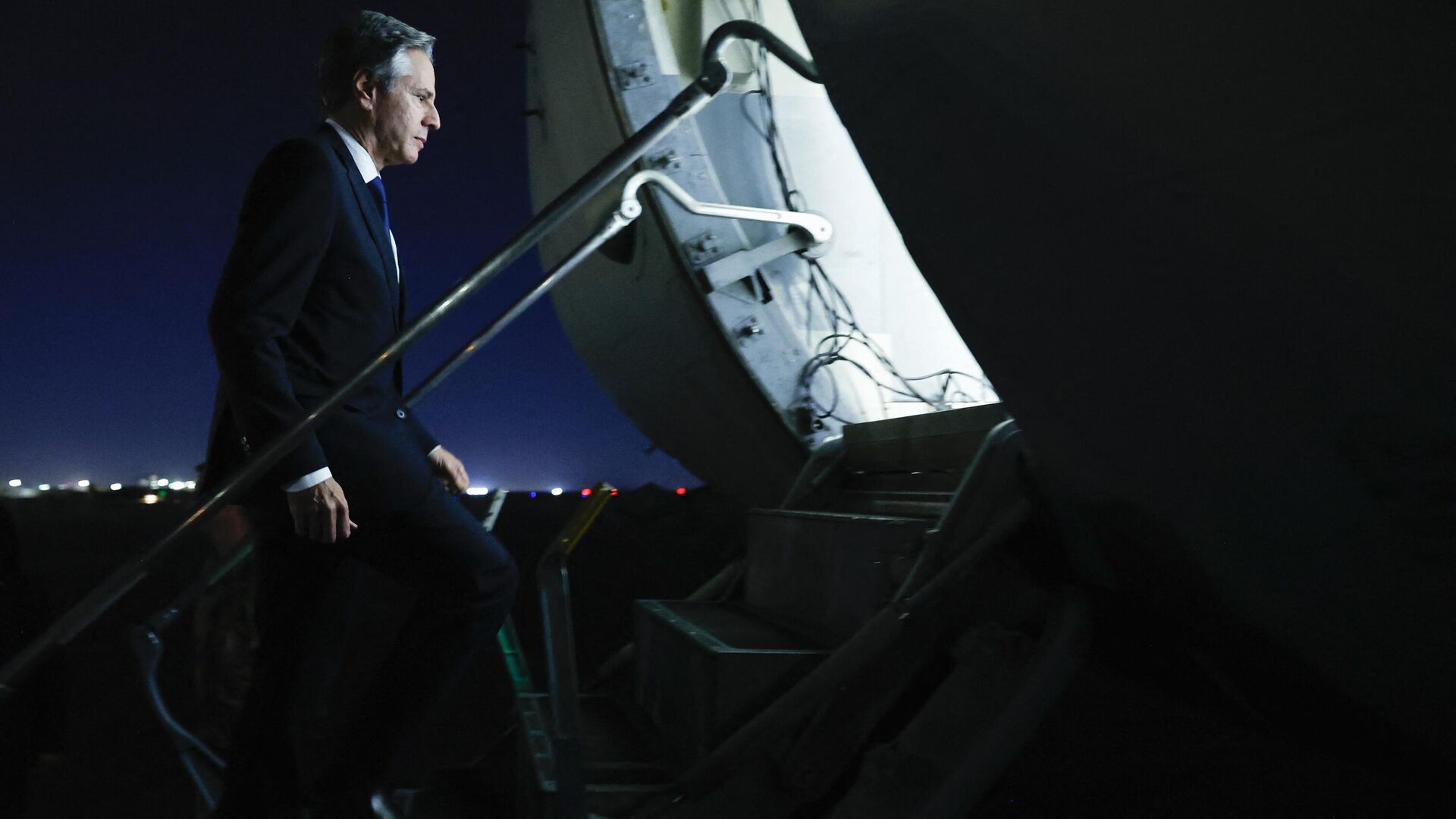https://sputnikglobe.com/20231106/blinkens-diplomatic-push-earns-tepid-response-amid-palestine-israel-conflict-1114755627.html
Blinken's Diplomatic Push Earns Tepid Response Amid Palestine-Israel Conflict
Blinken's Diplomatic Push Earns Tepid Response Amid Palestine-Israel Conflict
Sputnik International
America’s top diplomat, Antony Blinken, spent three days on a frantic diplomatic Middle East campaign amid the spiraling Palatine-Israel conflict.
2023-11-06T13:09+0000
2023-11-06T13:09+0000
2024-01-30T10:27+0000
world
us
antony blinken
palestine-israel conflict
gaza strip
hamas
israel
palestinians
turkiye
israel defense forces (idf)
https://cdn1.img.sputnikglobe.com/img/07e7/0b/06/1114754638_0:173:3025:1875_1920x0_80_0_0_6e39d31676b5732507e4bec4d9c07c88.jpg
America’s top diplomat, Antony Blinken, may have spent three days on a frantic diplomatic Middle East campaign amid the spiraling Palestine-Israel conflict, but appears to have little to show for it.Israel, Jordan, the West Bank, Iraq and Turkiye were the stopovers made by the US Secretary of State in a seeming flurry of activity aimed at preventing further spill out of the Palestine-Israel war across the Middle East region. But the result seemed to be a fiasco on all fronts.IsraelIn Israel, where Blinken made a surprise visit on November 3, he stated the need to “do more to protect Palestinian civilians.” However the words fell on deaf ears as he conferred with Israel’s war cabinet. Truth told, from the outset Washington has been pledging full support for ally Israel in the wake of the Hamas attack on October 7.Furthermore, the IDF said on Tuesday that it had hit the Jabalia camp in the Gaza Strip, writing off the death of civilians as a consequence of a "tragedy of war". According to the exclave’s Interior Ministry, at least 400 people in the refugee camp were killed and injured by the Israeli air attacks.While the top US diplomat pressed Israel to agree to “humanitarian pauses,” along with “tangible steps that can be taken to increase the sustained delivery of food, water, medicine, fuel and other essential needs,” reports claim that the Israeli side was not at all receptive. Israeli Prime Minister Benjamin Netanyahu has publicly rejected any pause in fighting without hostages held by Hamas being released first. Netanyahu underscored in a subsequent televised address that he told Blinken that “we are continuing full force.”It should be noted that Washington, which positioned US warships in the region in what the Pentagon has characterized as a “signal” to Hezbollah and “other actors” not to get involved in the Palestinian-Israeli crisis, has refused to support any calls for a ceasefire.The resolution overwhelmingly passed in the UN General Assembly on October 27 calling for a ceasefire in Gaza was rejected by both Israel and the United States. As protests across the globe gather strength, voicing outrage over the civilian death toll in the Palestinian enclave, there have been US reports that President Joe Biden and his top advisers warned Israel in private conversations about fallout from that global outcry, but to no avail.In a recent joint statement, the heads of the UN’s major humanitarian agencies and global charities urged an “immediate humanitarian ceasefire” in Gaza, denouncing the situation as “horrific” and “unacceptable.”JordanThe next day after visiting Israel, Blinken met representatives of Israel's Arab neighbors in Jordan, who all reiterated calls for an immediate ceasefire.The visit came after US President Joe Biden's October meeting with Arab leaders in Jordan was cancelled in an unprecedented snub in protest at the bombing of the al-Ahli Baptist hospital in Gaza. While Blinken appeared to try and urge his Arab counterparts to deliberate the long-term future for Palestinians, the awning divide between the US and the Middle East nations was most palpable during the Saturday news conference in Amman.“Stop this madness,” he said, addressing Antony Blinken, underscoring that Israel was “committing war crimes.” An “immediate cease-fire” in Gaza without any preconditions was also urged by Egyptian Foreign Minister Sameh Shoukry.West BankAntony Blinken’s next stop was the West Bank, to meet with Palestinian Authority President Mahmoud Abbas. Blinken was ensconced in a vehicle that was part of an armored motorcade, with the US State Department confirming the trip only after the American official had departed the West Bank.According to State Department spokesman Matthew Miller, Blinken reaffirmed US commitment to delivery humanitarian assistance to Gaza, adding that Palestinians must not be “forcibly displaced.” The meeting between Blinken and Abbas, which was tense "because there are differences," as per Husam Zomlot, Palestinian ambassador to the UK, ended without any public statement being released. "Our president demanded an immediate ceasefire to the atrocious, murderous assault by Israel on our civilians, on our people," Zomlot said.An unannounced visit to Cyprus was next on Blinken’s itinerary, where he met with President Nikos Christodoulides and Foreign Minister Constantinos Kombos. The US diplomat’s meeting with them was inside his plane.IraqAntony Blinken then traveled to Baghdad for yet another unannounced foray, meeting with Iraqi Prime Minister Mohammed Shiaa al-Sudani.Blinken referred to the meeting as a "good, productive, candid” one at a news conference in Baghdad. However, right after the visit Shiite groups tried to attack US military bases in Iraq with the help of drones, a source told the Iraqi news agency Shafaq News. Both drones were shot down by the armed forces, it was added.Earlier, the military group Hezbollah warned that Blinken's visit would be met with "an unprecedented escalation."TurkiyeAntony Blinken traveled to Turkiye later on Sunday amid already ongoing protests there over the developments in Gaza. Turkiye is the latest country to scale down diplomatic contact with Israel, with President Recep Tayyip Erdogan announcing he would be withdrawing his country’s ambassador to Tel Aviv.According to the Turkish foreign ministry, Sakir Ozkan Torunlar would be withdrawn from Israel “in view of the unfolding humanitarian tragedy in Gaza caused by the continuing attacks by Israel against civilians, and Israel's refusal [to accept] a ceasefire.”Furthermore, the Turkish President stated on Saturday that Gaza must be part of an independent Palestinian state, adding that Ankara was against plans tailored towards “gradually erasing Palestinians” from history.Blinken was accorded a lukewarm reception upon arrival in Ankara, with observers on social media saying there was a glaring absence of any high-level official welcoming him. It was reported that President Recep Tayyip Erdogan was away, traveling across Turkiye’s north-east, snubbing the US official. Just hours before Blinken's arrival, hundreds of protesters marched on an air base housing US forces in the south-east of Turkiye, with police being forced to resort to tear gas and water cannon.The US Secretary of State Antony met with Turkish Foreign Minister Hakan Fidan in Ankara on Monday. As for Turkiye's Foreign Minister Hakan Fidan, he told US Secretary of State that Ankara considers Israeli attacks targeting civilians, and the destruction of infrastructure "unacceptable," as per a Turkish diplomatic source.At the end of Antony Blinken’s diplomatic dash, one asks the question: what is the US response to the ceasefire that the leaders of Arab countries have called for?Blinken doubled down on the US stance that it would not push for it, saying:
https://sputnikglobe.com/20231103/blinken-holds-press-conference-in-tel-aviv-after-talks-with-israeli-government-1114689490.html
https://sputnikglobe.com/20231019/amman-will-never-allow-mass-displacement-of-palestinians-to-jordan---foreign-minister-1114305159.html
https://sputnikglobe.com/20231013/abbas-rejects-attempts-to-relocate-population-of-gaza-strip-at-talks-with-blinken---reports-1114168199.html
https://sputnikglobe.com/20231029/militants-ignore-bidens-warning-rain-down-fire-on-us-forces-in-iraq-syria-1114572582.html
https://sputnikglobe.com/20231101/blinkens-wishful-thinking-why-us-peace-plans-for-gaza--israel-are-out-of-touch-1114646362.html
gaza strip
israel
turkiye
palestine
Sputnik International
feedback@sputniknews.com
+74956456601
MIA „Rossiya Segodnya“
2023
News
en_EN
Sputnik International
feedback@sputniknews.com
+74956456601
MIA „Rossiya Segodnya“
Sputnik International
feedback@sputniknews.com
+74956456601
MIA „Rossiya Segodnya“
america’s top diplomat, antony blinken, us secretary of state's middle east diplomatic mission, spiraling palestine-israel conflict, israel-hamas war
america’s top diplomat, antony blinken, us secretary of state's middle east diplomatic mission, spiraling palestine-israel conflict, israel-hamas war
Blinken's Diplomatic Push Earns Tepid Response Amid Palestine-Israel Conflict
13:09 GMT 06.11.2023 (Updated: 10:27 GMT 30.01.2024) Under the cover of darkness, shrouded in secrecy, with tight security and armed convoys, US Secretary of State Antony Blinken embarked on a diplomatic mission encompassing a host of countries in the Middle East amid Israel waging its war against Hamas, and the Gaza civilian death toll soaring.
America’s top diplomat, Antony Blinken, may have spent three days on a frantic diplomatic Middle East campaign amid the
spiraling Palestine-Israel conflict, but appears to have little to show for it.
Israel, Jordan, the West Bank, Iraq and Turkiye were the stopovers made by the US Secretary of State in a seeming flurry of activity aimed at preventing further spill out of the
Palestine-Israel war across the Middle East region. But the result seemed to be a fiasco on all fronts.
In Israel, where Blinken made a surprise visit on November 3, he stated the need to “
do more to protect Palestinian civilians.” However the words fell on deaf ears as he conferred with Israel’s war cabinet. Truth told, from the outset Washington has been pledging full support for ally Israel in the wake of the
Hamas attack on October 7.
Israel Defense Forces (IDF) have been pummeling the Gaza Strip with strikes that have gradually gained in strength and wreaked vast destruction upon the enclave. At least 9,488 Palestinians have died in Israel’s strikes on Gaza so far, according to local health authorities.
Furthermore, the IDF said on Tuesday that it had hit the
Jabalia camp in the Gaza Strip, writing off the death of civilians as a consequence of a "tragedy of war". According to the exclave’s Interior Ministry, at least 400 people in the refugee camp were killed and injured by the Israeli air attacks.
While the top US diplomat pressed Israel to agree to “humanitarian pauses,” along with “tangible steps that can be taken to increase the sustained delivery of food, water, medicine, fuel and other essential needs,” reports claim that the Israeli side was not at all receptive. Israeli Prime Minister Benjamin Netanyahu has publicly rejected any pause in fighting without hostages held by Hamas being released first. Netanyahu underscored in a subsequent televised address that he told Blinken that “we are continuing full force.”
It should be noted that Washington, which positioned US warships in the region in what the Pentagon has characterized as a “signal” to
Hezbollah and “other actors” not to get involved in the Palestinian-Israeli crisis, has refused to support any calls for a ceasefire.
The resolution overwhelmingly passed in the UN General Assembly on October 27 calling for a
ceasefire in Gaza was rejected by both Israel and the United States. As protests across the globe gather strength, voicing outrage over the civilian death toll in the Palestinian enclave, there have been US reports that President Joe Biden and his top advisers warned Israel in private conversations about fallout from that
global outcry, but to no avail.
In a recent joint statement, the heads of the UN’s major humanitarian agencies and global charities urged an “immediate humanitarian ceasefire” in Gaza, denouncing the situation as “horrific” and “unacceptable.”
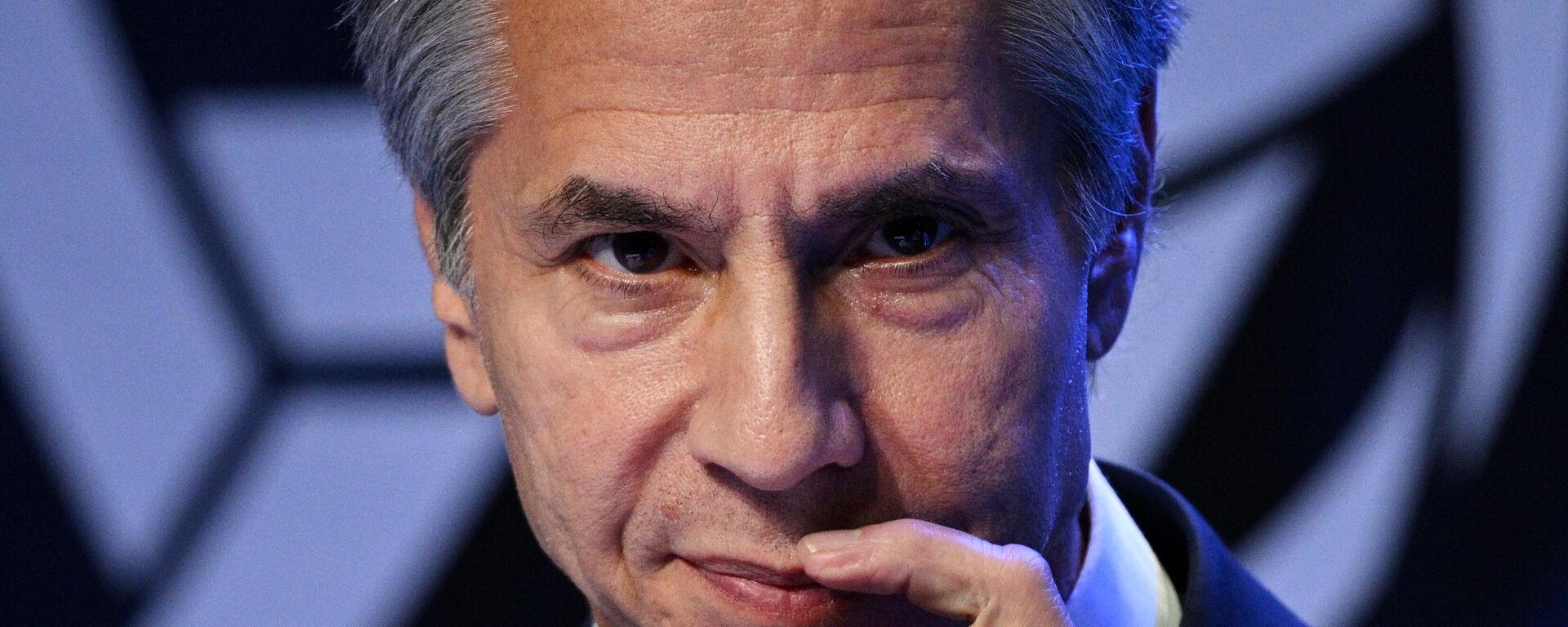
3 November 2023, 13:31 GMT
The next day after visiting Israel, Blinken met representatives of Israel's Arab neighbors in Jordan, who all reiterated calls for an immediate ceasefire.
The visit came after US President Joe Biden's October meeting with Arab leaders in Jordan was cancelled in an
unprecedented snub in protest at the bombing of the al-Ahli Baptist hospital in Gaza. While Blinken appeared to try and urge his Arab counterparts to deliberate the long-term future for Palestinians, the awning divide between the US and the Middle East nations was most palpable during the Saturday news conference in Amman.
"How can we even entertain what will happen in Gaza when we do not know what kind of Gaza will be left after this war is done? Are we going to be talking about a wasteland? Are we going to be talking about a whole population reduced to refugees?" Jordan's Foreign Minister Ayman Safadi queried.
“Stop this madness,” he said, addressing Antony Blinken, underscoring that Israel was “committing war crimes.” An “immediate cease-fire” in Gaza without any preconditions was also urged by Egyptian Foreign Minister Sameh Shoukry.
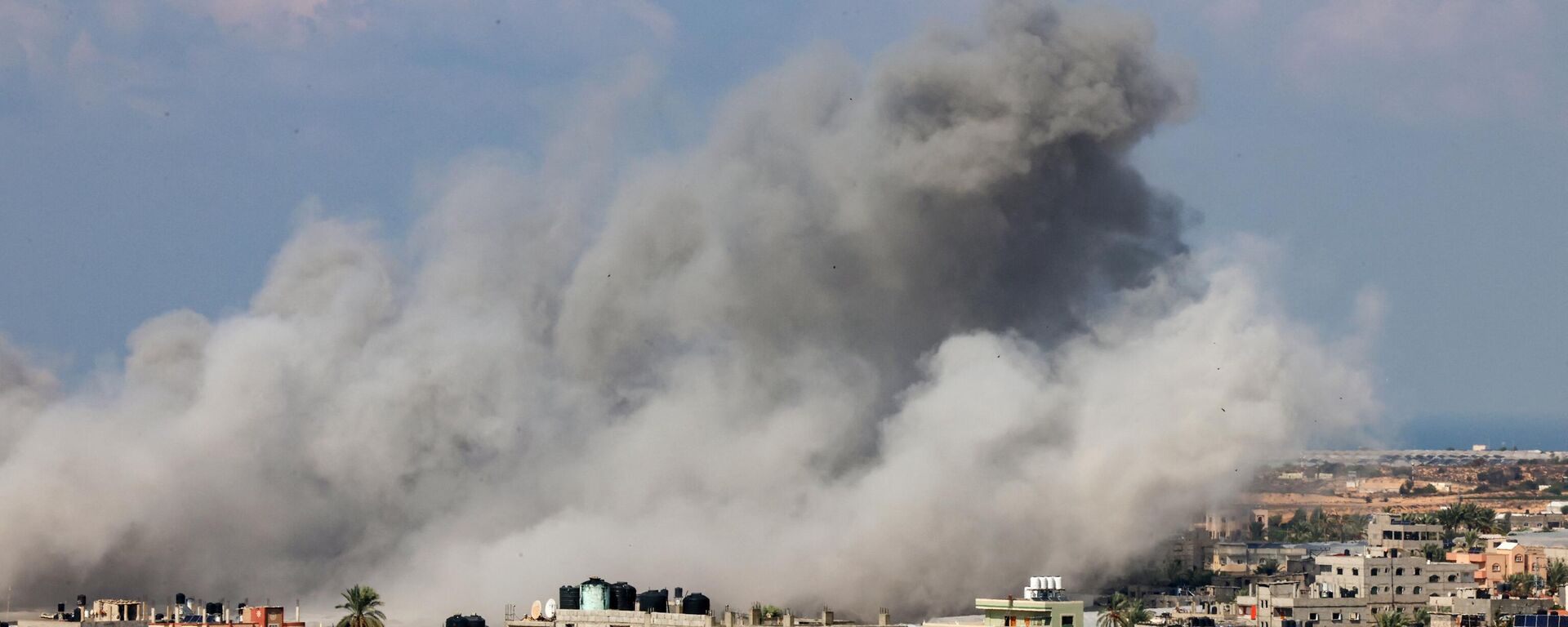
19 October 2023, 00:32 GMT
Antony Blinken’s next stop was the West Bank, to meet with Palestinian Authority President Mahmoud Abbas. Blinken was ensconced in a vehicle that was part of an armored motorcade, with the US State Department confirming the trip only after the American official had departed the West Bank.
According to State Department spokesman Matthew Miller, Blinken reaffirmed US commitment to delivery humanitarian assistance to Gaza, adding that Palestinians must not be “forcibly displaced.” The meeting between Blinken and Abbas, which was tense "because there are differences," as per Husam Zomlot, Palestinian ambassador to the UK, ended without any public statement being released. "Our president demanded an immediate ceasefire to the atrocious, murderous assault by Israel on our civilians, on our people," Zomlot said.
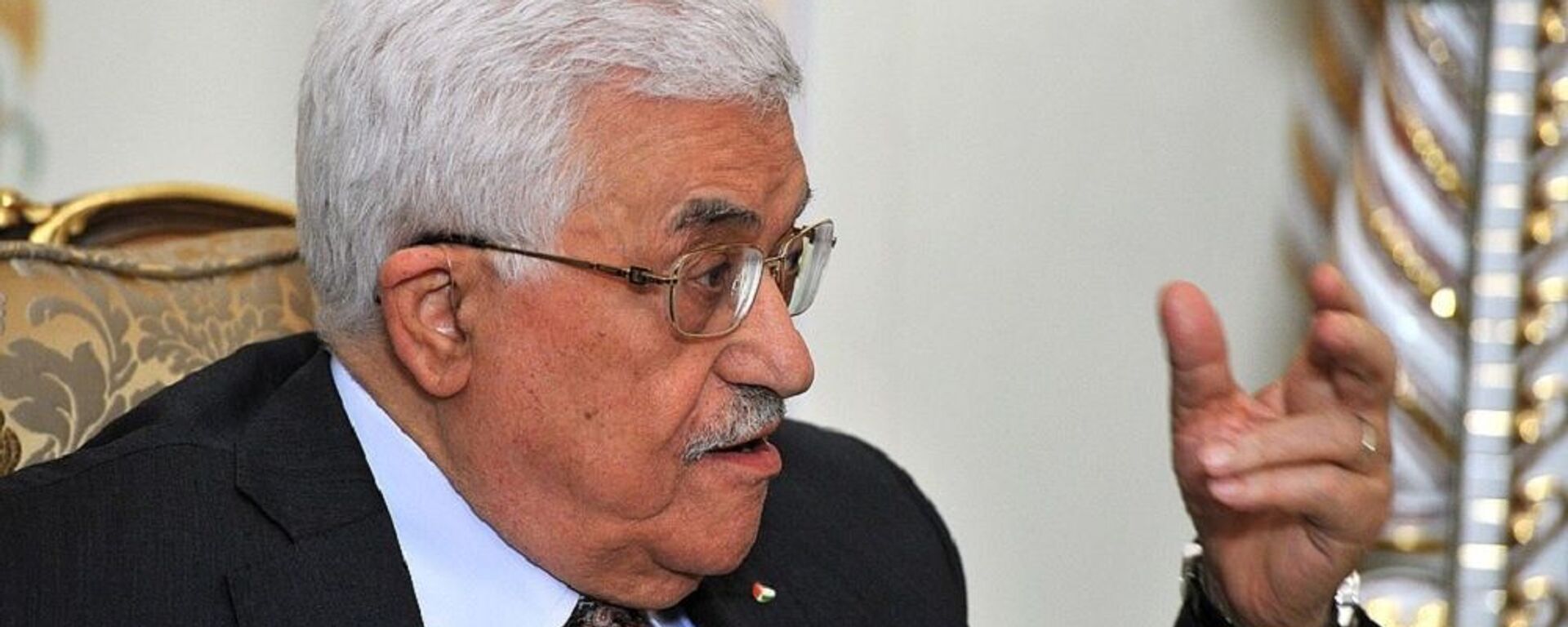
13 October 2023, 11:16 GMT
An unannounced visit to Cyprus was next on Blinken’s itinerary, where he met with President Nikos Christodoulides and Foreign Minister Constantinos Kombos. The US diplomat’s meeting with them was inside his plane.
Antony Blinken then traveled to Baghdad for yet another unannounced foray, meeting with Iraqi Prime Minister Mohammed Shiaa al-Sudani.
"The Secretary urged the Prime Minister to hold accountable those responsible for continuing attacks on US personnel in Iraq," State Department spokesperson Matthew Miller said in a statement. They also discussed "the need to ensure that Palestinians are not forcibly displaced outside of Gaza," Miller said.
Blinken referred to the meeting as a "good, productive, candid” one at a news conference in Baghdad. However, right after the visit Shiite groups tried to attack US military bases in Iraq with the help of drones, a source told the Iraqi news agency Shafaq News. Both drones were shot down by the armed forces, it was added.
Earlier, the military group
Hezbollah warned that Blinken's visit would be met with "
an unprecedented escalation."
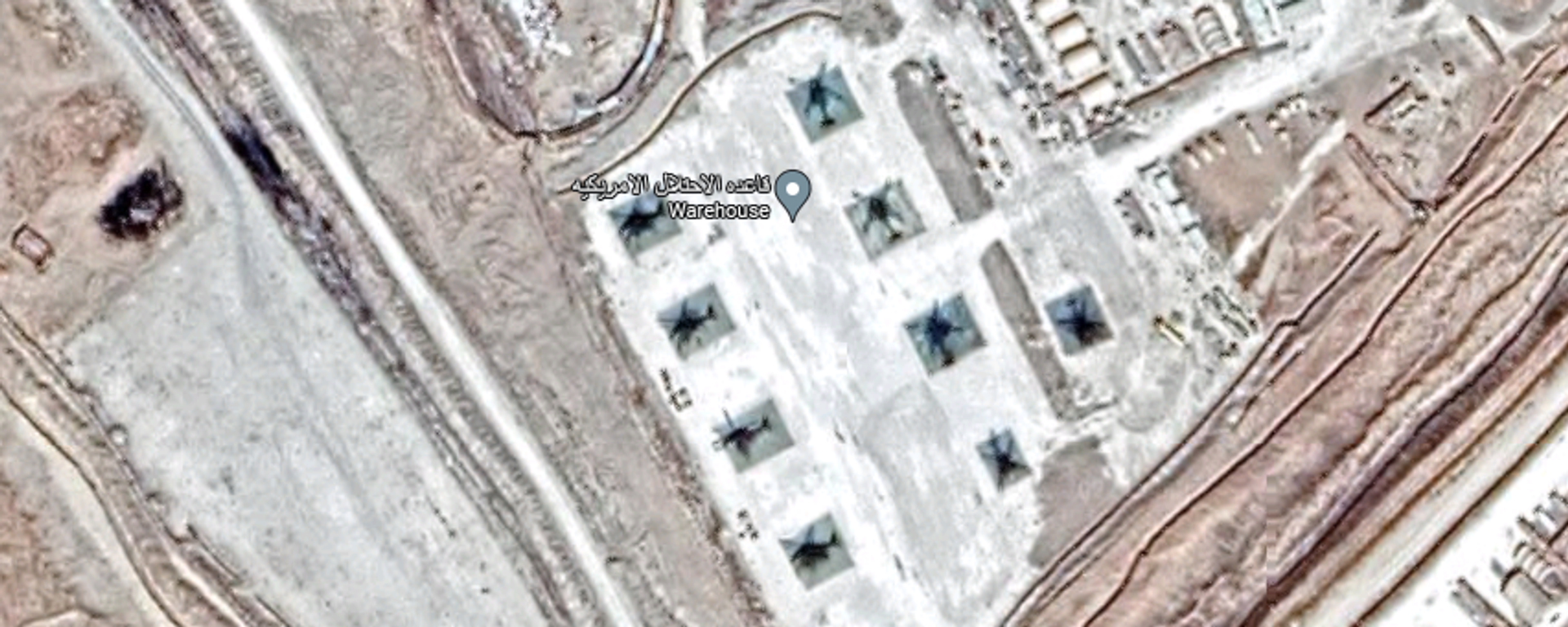
29 October 2023, 11:58 GMT
Antony Blinken traveled to
Turkiye later on Sunday amid already ongoing protests there over the developments in Gaza. Turkiye is the latest country to scale down diplomatic contact with Israel, with President Recep Tayyip Erdogan announcing he would be withdrawing his country’s ambassador to Tel Aviv.
According to the Turkish foreign ministry, Sakir Ozkan Torunlar would be withdrawn from Israel “in view of the unfolding humanitarian tragedy in Gaza caused by the continuing attacks by Israel against civilians, and Israel's refusal [to accept] a ceasefire.”
Furthermore, the Turkish President stated on Saturday that Gaza must be part of an independent Palestinian state, adding that Ankara was against plans tailored towards “gradually erasing Palestinians” from history.
Blinken was accorded a lukewarm reception upon arrival in Ankara, with observers on social media saying there was a glaring absence of any high-level official welcoming him. It was reported that
President Recep Tayyip Erdogan was away, traveling across Turkiye’s north-east, snubbing the US official. Just hours before Blinken's arrival, hundreds of protesters marched on an air base housing US forces in the south-east of Turkiye, with police being forced to resort to tear gas and water cannon.
The US Secretary of State Antony met with Turkish Foreign Minister Hakan Fidan in Ankara on Monday. As for Turkiye's Foreign Minister
Hakan Fidan, he told US Secretary of State that Ankara considers Israeli attacks targeting civilians, and the destruction of infrastructure "unacceptable," as per a Turkish diplomatic source.
At the end of Antony Blinken’s diplomatic dash, one asks the question: what is the US response to the ceasefire that the leaders of Arab countries have called for?
Blinken doubled down on the US stance that it would not push for it, saying:
"It is our view now that a ceasefire would simply leave Hamas in place, able to regroup and repeat what it did on October 7." Temporary humanitarian pauses would purportedly protect civilians, "while still enabling Israel to achieve its objective, the defeat of Hamas."
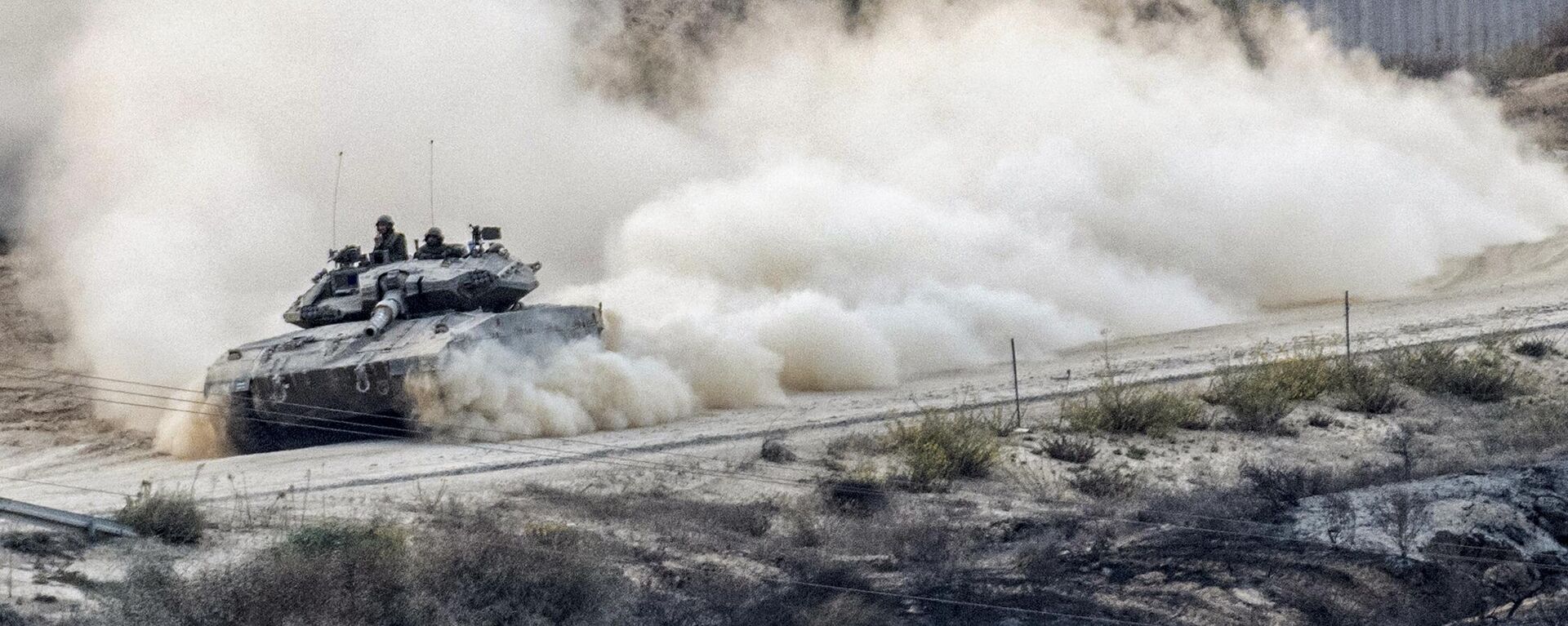
1 November 2023, 17:10 GMT
